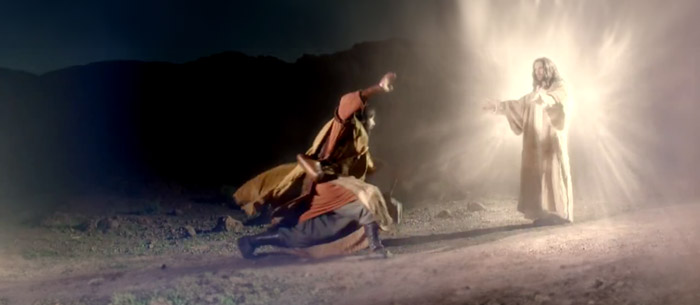Acts 9:4
And he fell to the earth, and heard a voice saying unto him,
Saul, Saul, why persecutest thou me?
According to Acts 26:16, Paul was to be a witness of the things he had seen (the things preached by Stephen and the Twelve) and of things in the which the Lord would appear unto him. Therefore, his Gospel-centered around The Kingdom, the same as the Twelve. There was no disagreement on that score at the council in Acts 15:12-17. But the new things Paul did receive of the Lord and preach was that Gentiles could partake of Israel's spiritual things by faith without keeping the law (Romans 15:27). Paul's preaching of The Kingdom brought on the accusation at Thessalonica that he proclaimed another King than Caesar (Acts 17:7). Paul wrote seven Epistles during Acts.
1. Galatians. To Gentile believers. The circumcision, still under the law, trying to bring the Gentile under it, too. No Dispensation of The Mystery in that. Gentile believers are children of Abraham by faith and partakers of the promise (Gal. 3:29). The hope, the New Jerusalem (Gal. 4:26).
2. Hebrews. To the Jewish believers. Still under the law as priesthood is a main theme. They are still God's firstborn (Heb. 12:23; cf. Exo. 4:22). Their Hope is the New Jerusalem (Heb. 12:22). The things of the law pointed to better things of the coming Kingdom. No Dispensation of The Mystery here.
3. 1 Thessalonians. Both Jews and Gentiles are there (Acts 17:4). The Theme of 1 Thes. 4:13-18 is the coming of Israel's Messiah to set up His Kingdom. Times and seasons are now known because Revelation is now written (contrast Acts 1:6-7). No Dispensation of The Mystery here.
4. 2 Thessalonians. Had Israel's hope. Warned that the day of the Lord had not begun as some had said (2 Thes. 2:1-4). They were suffering for The Kingdom (2 Thes. 1:5). There must be a falling away in Israel before the day of the Lord (2 Thes. 2:3). Still under law and commandments (2 Thes. 3:6). Nothing here about the Dispensation of The Mystery.
5. 1 Corinthians. Both Jew and Gentile. The Jew is spoken to in Chapters 10 and 11. Gentiles are spoken to in Chapter 12. Still, under law, Paul rebukes them in Chapter 10 because some sleep (are dead), and some are sickly because of the Memorial bread and wine. In the breaking of the bread, The Lord's Body was not being observed correctly by some during the feast of Passover—their Hope, the coming of the Lord Jesus, as revealed in 1 Cor. 15:51-52. Note the reference to the Revelation in speaking of the last trumpet. They still had the gifts of the Spirit. No Dispensation of The Mystery here.
6. 2 Corinthians. Paul is still a minister of the New Testament (2 Cor. 3:6), which is for the house of Israel and Judah (Jer. 31:31). Under the law, and Christ the sin-offering (2 Cor. 5:21). Paul tells of his Revelation like John's that occurs above 14 years ago (2 Cor. 12:1-5). No Dispensation of The Mystery in any of this.
7. Romans. Both to Jew and Gentile. Jew spoken to in Rom. 2:1-10 especially. Gentiles told of their place in The Kingdom and why in Chapters 10 and 11. Gentile believers are partakers of Israel's spiritual things, not of the Dispensation of The Mystery (Rom. 15:27). Dispensationally, the Jew is first (Rom. 1:16). The Jews have a great advantage over the Gentiles (Rom. 9:1-5). The law is still in effect (Rom. 13:9-10).
In all Seven of these Epistles, there is no hint of or mention of the Dispensation of The Mystery.

